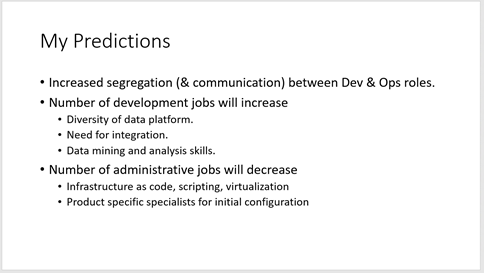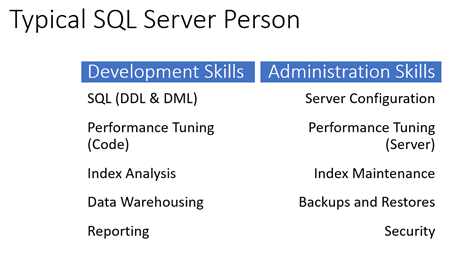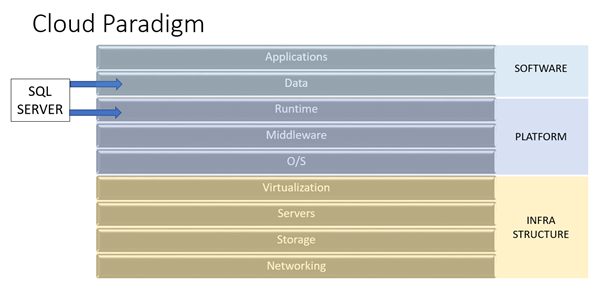Last weekend was SQLSaturday Atlanta 2017, and I was not only an organizer, but a presenter. In the future, I’ll need to balance that a little better (especially when we’re dealing with a lot of unknowns for the day, like a new building). Overall, I think my presentation went well; had a lot of great hallway conversations with folks later, and got some good feedback. You can find the slide deck here, or look on the Code, etc tab above.
However, during my presentation, a couple of questions came up that I didn’t have a great answer for; mostly it was revolving around the first bullet point on this slide:

Why, if DevOps as a philosophy encourages better communication between development and operations, do I believe that there will be increased segregation between those roles? I fumbled for an answer during the presentation, but then went back and realized what I left out in my explanation, so I thought I’d take a stab at rebuilding my argument and explain where I was going with this:
DevOps is built on a Service-Oriented Architecture (SOA) model.
Services logically represent business activities; they are self-contained, and the inner workings of each service are opaque to the consumers. Services can be built using other services, but that rule of opacity stays true; when you consume a service, you don’t care what it’s doing under the covers. It just has to provide a consistent output when given a consistent input.
The Cloud Paradigm is also built on a SOA model.
Software-as-a-Service is built on a Platform-as-a-Service, which is in turn built on an Infrastructure-as-a-Service. Communication between service layers must be consistent and repeatable, but processes and procedures within each services should be opaque. Furthermore, the consumers of a service are not the same; for example, if you have a web portal displaying account information to a client. The client consumes Software-as-a-Service; they just want to see their account information. They don’t care how many servers are involved or how the network is laid out. Software-as-a-Service consumes from the Platform layer; they may have a requirement that they use a particular database system, or OS, but specific configuration isn’t exposed to them. Software engineers define performance expectations (e.g, “we need to commit 1000 transactions per second”), and leave it up to the Platform (and Infrastructure) engineers to meet that expectation.
The traditional tasks associated with SQL Server Database Administration can be roughly divided into two roles: Development and Administration (Operations).
From this slide, I outline the general breakdown between skills:

SQL Server as a product spans the top two layers of the Cloud Paradigm:
Basically, I believe that traditional development skills belong to the Software-as-a-Service Layer, and traditional administration skills belong to the Platfom layer.

So by segregation of responsibilities, I mean that as companies embrace the Cloud paradigm, the current role of a DBA will fork into both Software-as-a-Service engineering (Dev) and Platform-as-a-Service engineering (Ops). I need to clarify that thought more in future presentations, because I may be using those terms differently than others would.
Thanks for reading, and if you attended, thanks for coming!
-Stu
